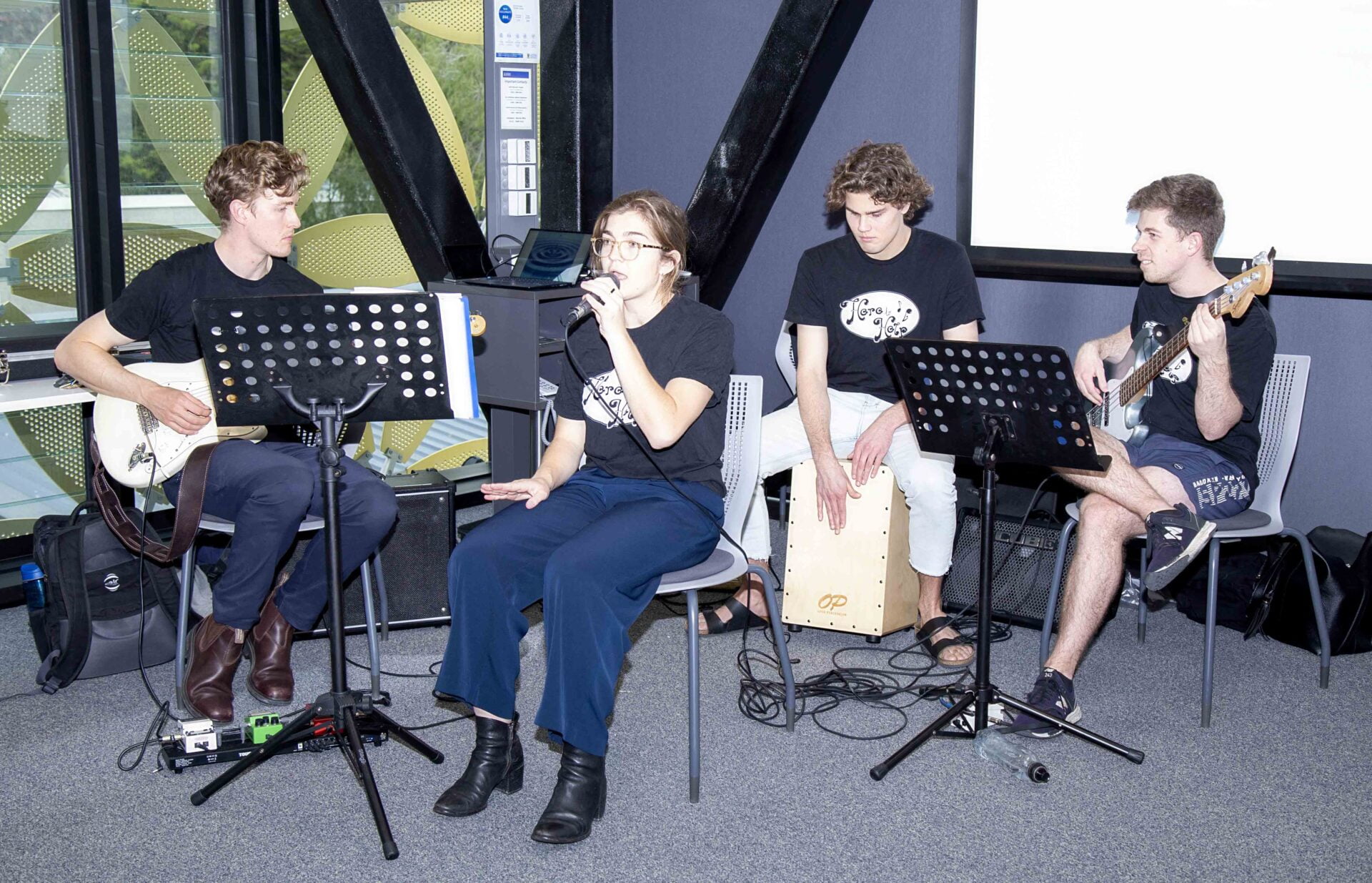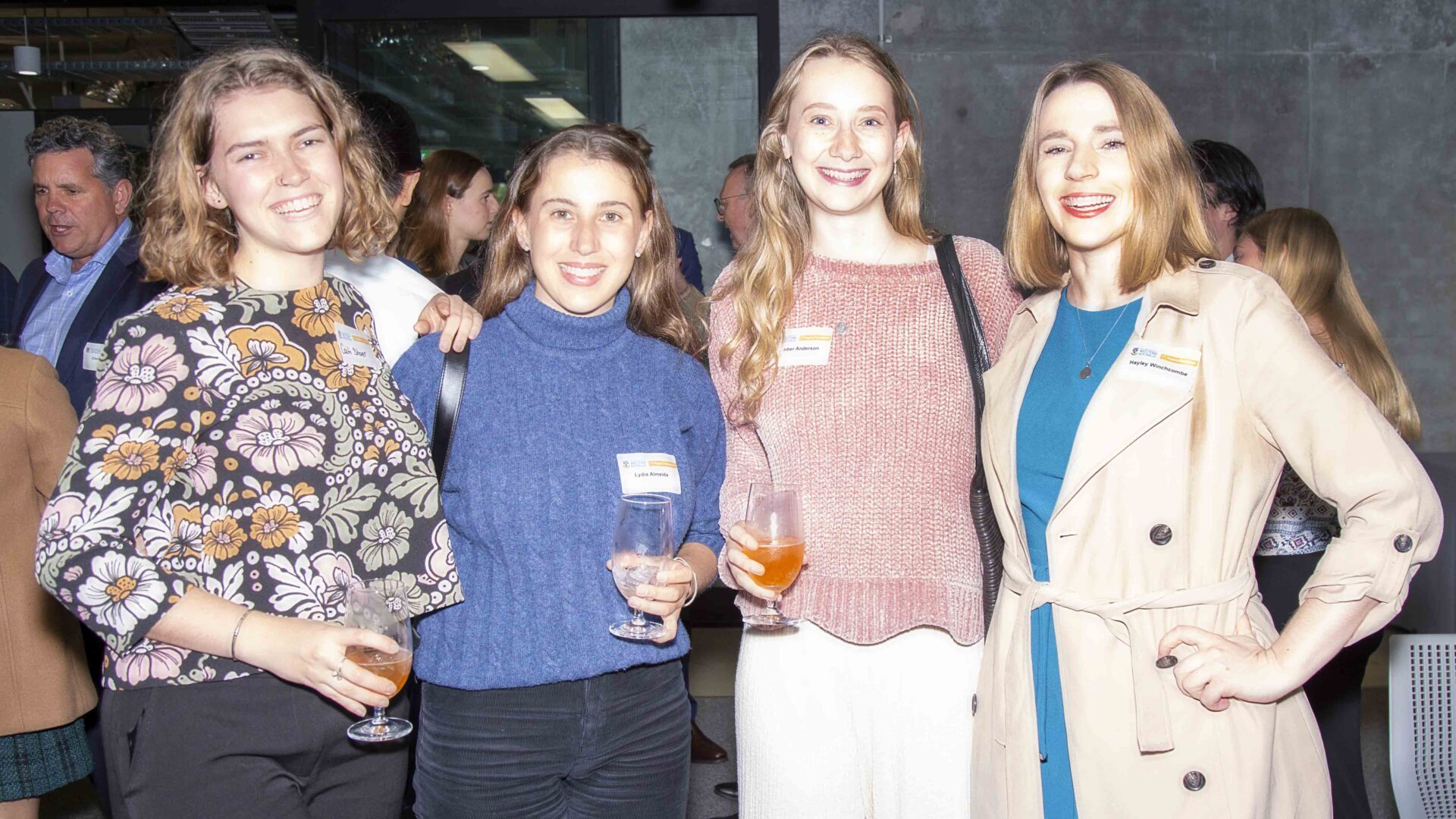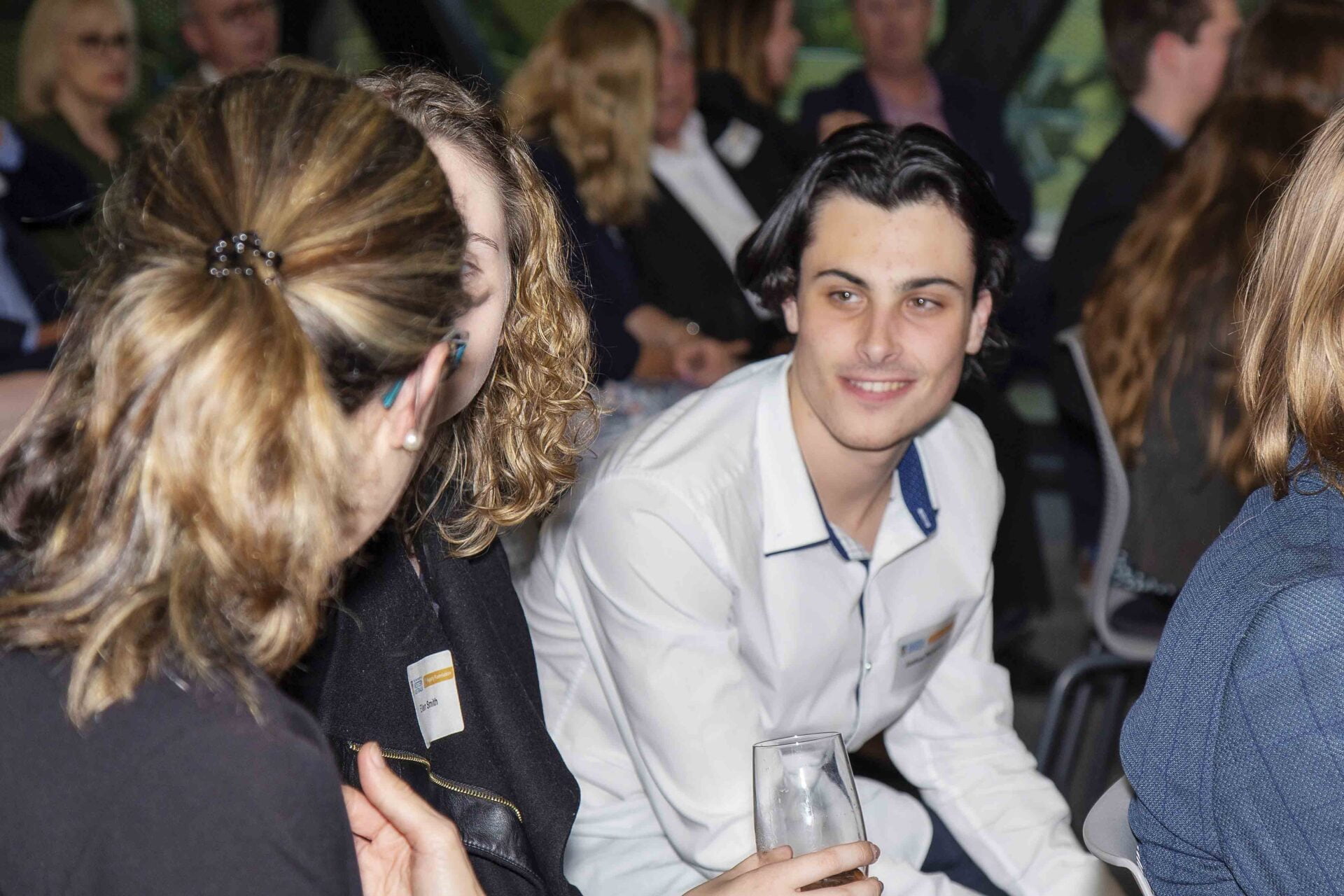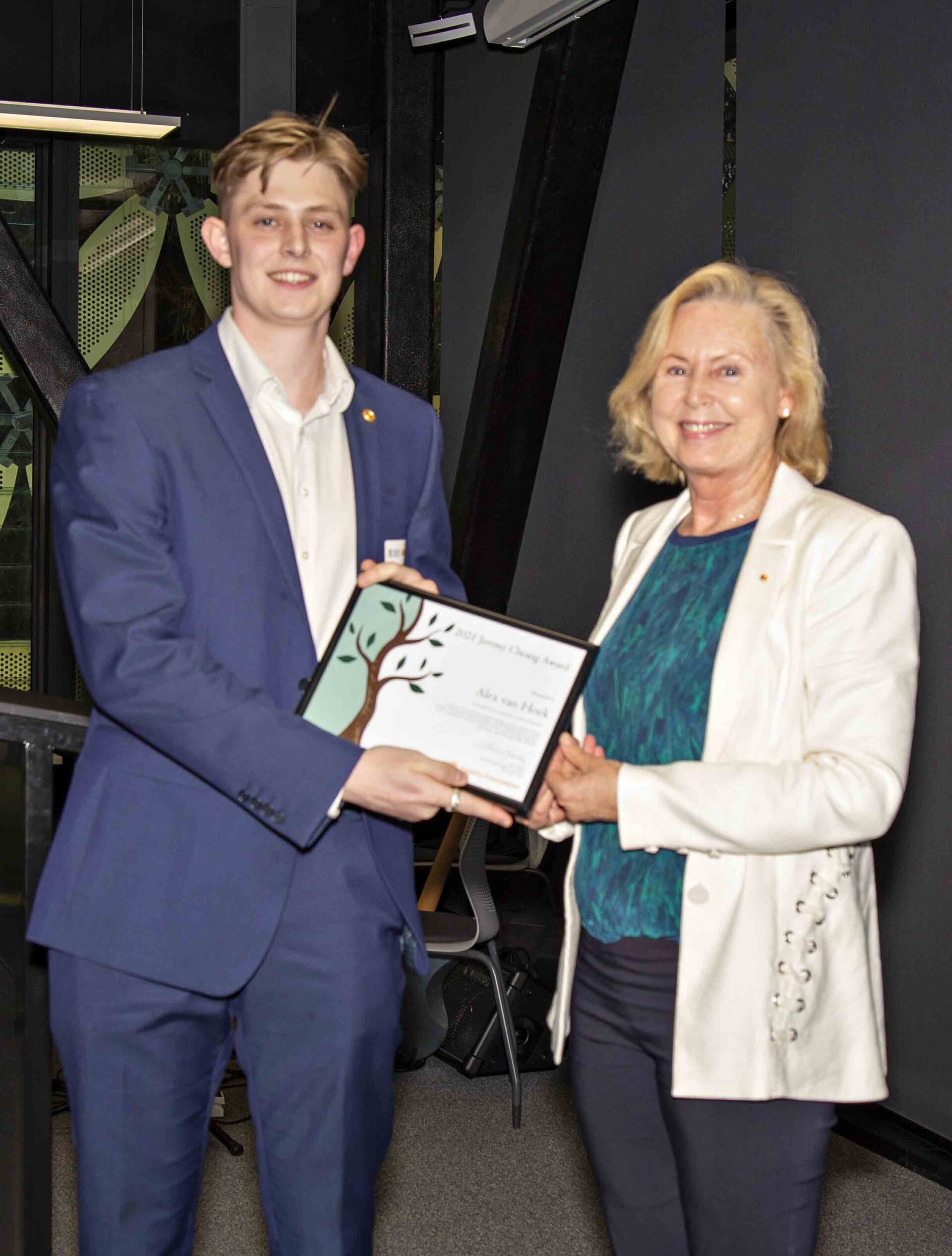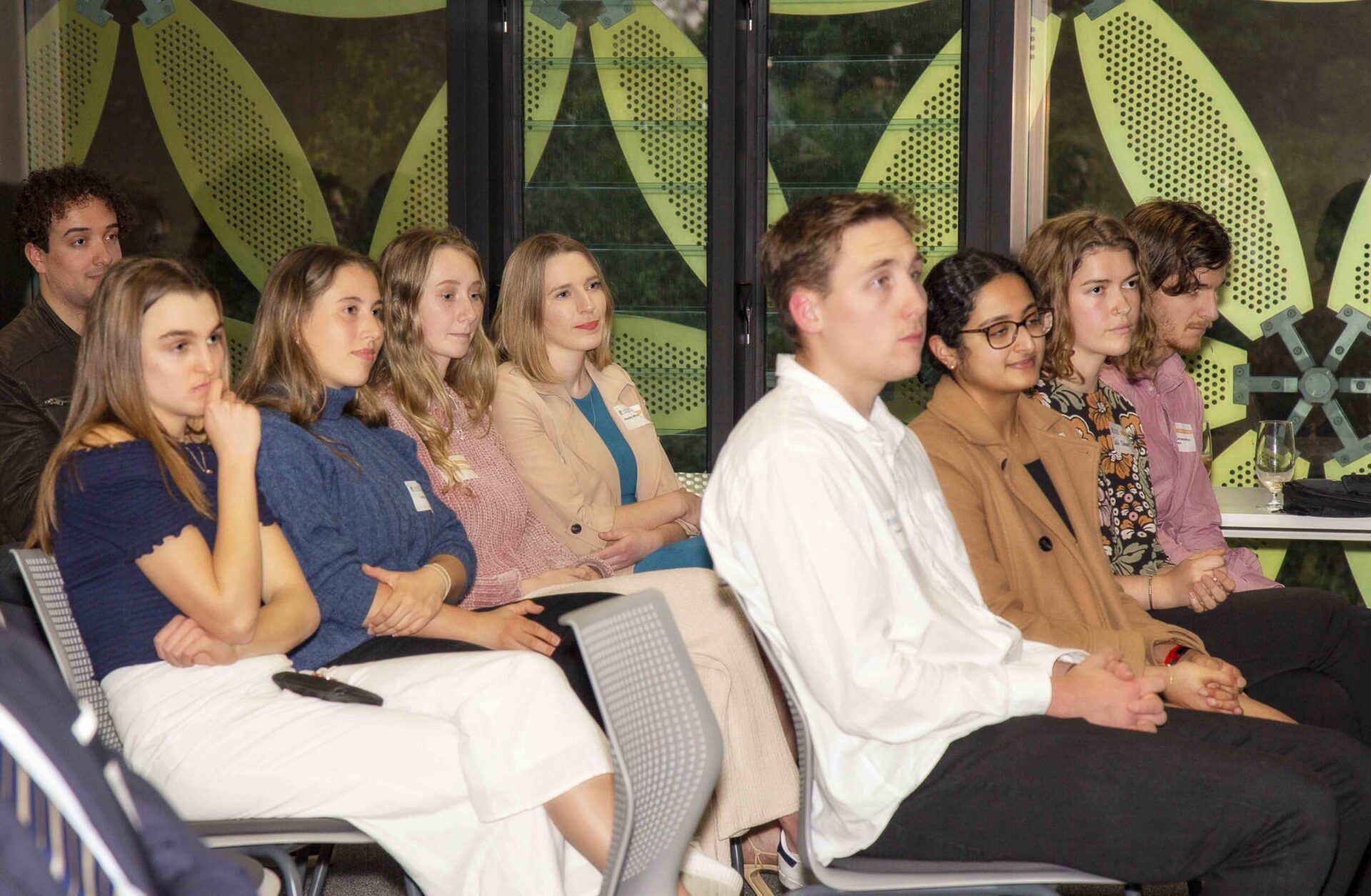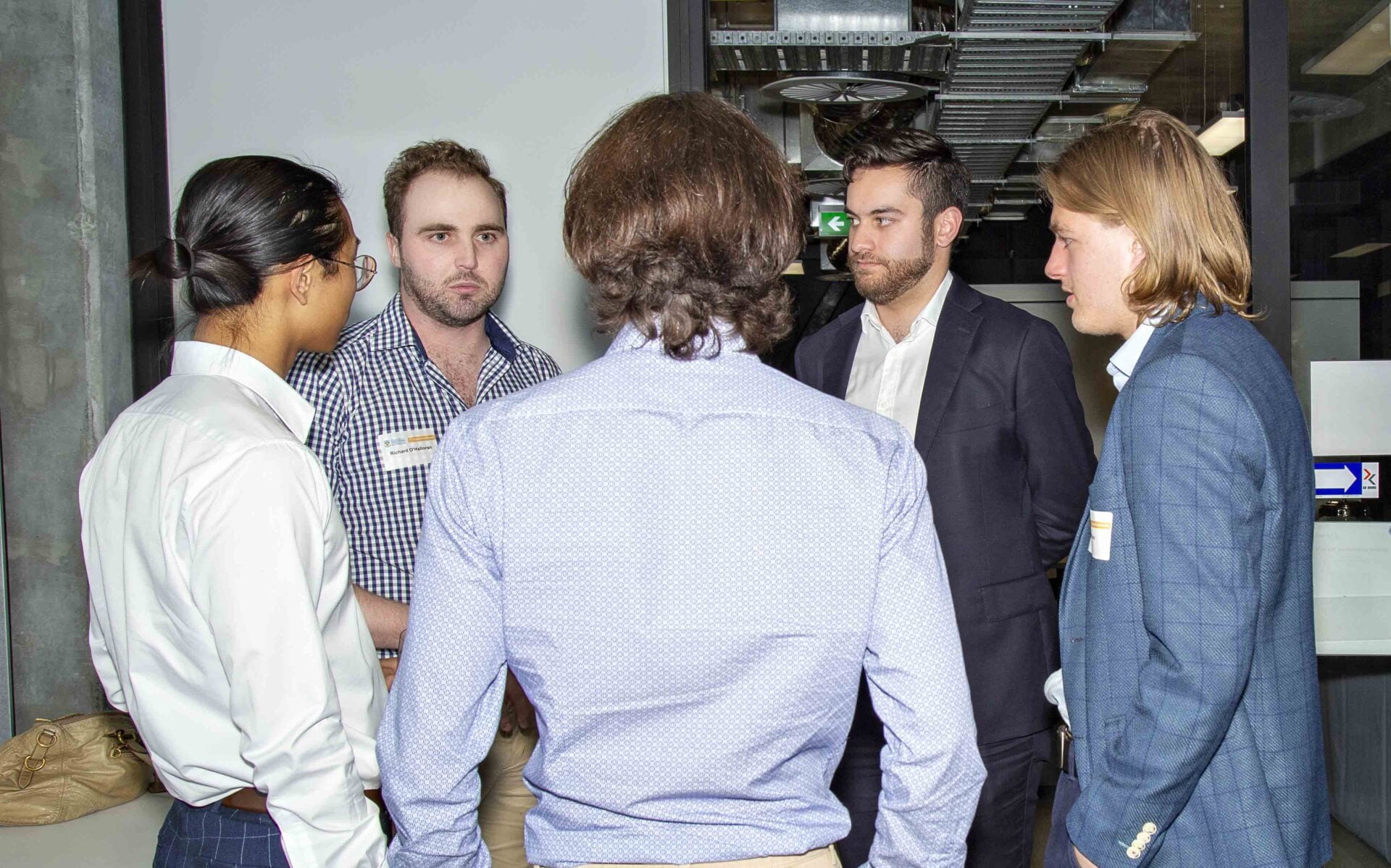A conversation with Kate Chaney
The UWA Fogarty Scholars joined Kate Chaney, independent candidate for the seat of Curtin, for an informal conversation on Wednesday. Kate said she was eager to speak with young people about the issues they are interested in.
Kate opened by explaining her background and what brought her to stand for a seat in Federal Parliament. She noted that a driving factor was her involvement on the board of Next 25, which is working to ensure that Australia maximises and shares its success across current and future generations, and her desire to play a more proactive part in addressing complex issues facing Australian society.
Kate believes her diverse career background in management consulting, law and strategy, as well as her senior corporate and not-for-profit roles, will enable her to contribute on several complex matters. She also acknowledged that there will matters she won’t know about. In talking about her decision to take the plunge to stand for Parliament, Kate said that she realised, “you only have one wild and precious life, so just go for it.”
Kate shared her four areas of focus with the Scholars, which were often touched on during the conversation with the group. These include:
- Integrity
- Climate change
- Economic opportunities and
- Inclusive communities.
The Scholars raised a wide range of topics important to them, spanning the implementation of the Uluru Statement from the Heart and how to achieve climate change through the creation of economic opportunities, to the provision of greater funding for sports beyond those with a high profile, the structural re-adjustment of industries, addressing and reducing the incidence of sexual harassment and gender inequality, to food and water security and homelessness.
How to find candidates aligned with Scholars’ individual values was also explored, and it was suggested that sites such as Vote Compass could be helpful in this regard. Kate also mentioned the site, They Vote for You which allows one to see how your electorate’s representative – or any member of Parliament – voted on various matters. Kate explained that only 0.4% of the population is a member of a political party and 50% of members of Parliament have only ever worked in politics.
The role of independents in Parliament was also explored, and Kate was asked what she hoped might result in 15 years. Three options she suggested were:
- Independents could cause the major parties to re-think their approach to various policies and their electorate.
- There could be a critical mass of independents, allowing them to work in different coalitions on various topics of interest. She noted whilst this could be logistically ‘messier’ than the two-party system, it could allow the larger, more complex issues to be dealt with more effectively (noting most of the matters before Federal Parliament are complex issues by their very nature); or
- The emergence of new parties, providing a viable alternative to the current ‘red’ vs ‘blue’ team, two party model.
The closing discussion centred on how young people could become more involved, with Kate providing several pointers. Whilst not suggesting that young people head straight for parliament, she stressed that, at a minimum, everyone should be thoughtful about their vote, because every vote counts.
Many thanks to Kate for addressing the group, and for Georgie Carey, Fogarty Scholar (2014) and now Deputy Mayor of the Mosman Park Town Council for being facilitator.
The UWA Fogarty Scholars and Alumni enjoyed an evening of canapés and music on Thursday, as they celebrated another inspiring year of learning, leadership and collective accomplishment. InspirED is the final event of the year for the Leadership and Enterprise program where UWA executive and staff, past speakers and friends of the Scholarship Program are invited to see and celebrate the achievement s of the Scholars.
Here to Help – Perth’s Charity Band, founded by UWA Fogarty Scholar Michael Hooper, provided a warm welcome to guests including past and present Fogarty Scholars, Professor Amit Chakma, Vice Chancellor of UWA, Annie Fogarty, Executive Chairperson of the Fogarty Foundation and special guests.
Professor Amit Chakma spoke about the significance of the scholarship program and congratulated the Scholars and Alumni for their committed commitment to education, excellence and achieving wonderful things all over the world.
Fogarty Scholars Ellen Smith and Josh Peckover shared anecdotes about their recent adventures co-convening the Fogarty Futures Leadership Conference, while Luke Thomas shared his experiences working for the Department of Prime Minister and Cabinet in Canberra. Guests were also inspired by the leadership efforts of Michael Hooper for creating Here to Help – Perth’s Charity Band, and Rachel Tantular as she spoke about her upcoming charity Indo-Pacific Traditional Music Concert.
Alexander van Hoek was announced as the 2021 recipient of the Jeremy Cheang Award. This award is presented to a Scholars to acknowledge their contribution to their chosen profession, the University and/or the wider community and to support them in their initiative. Alex received the award for his creation of Systematic, an aspiring not-for-profit initiative to help children foster a passion for STEM topics and skills.
Thank you to everyone who attended this InspirED event. It was a wonderful opportunity to hear from UWA Fogarty Scholars who are working towards and/or acting as leaders in our community and beyond.
Why did you apply to be a UWA Fogarty Scholar?
For years, the Fogarty Foundation has been renowned as a leader in the advancement of education and giving back to the community. It is these fundamental beliefs that really drew me to apply. I read a book many years ago and in it, the main character’s motto in life was to, ‘leave the world a little better than you found it.’ This really resonated with me, becoming my motivation in my last years of high school, whilst doing voluntary work and in my personal development. I believe that at its core, the Fogarty Foundation strives for a similar outcome and I felt that becoming a Fogarty Scholar would provide me with many opportunities and ideas regarding making this positive difference in the world and giving back to the community.
What are you studying and why have you chosen that field?
I am studying a double major in Biochemistry & Molecular Biology and Immunology & Microbiology. I find the areas of Biochemistry, Molecular Biology and Microbiology especially interesting as I am eager to discover and begin to understand all the microscopic processes and changes that occur literally under our noses, especially those we cannot see or even begin to comprehend. I am also keen to delve more deeply into the mechanisms of life, and through my understanding of many of these concepts, be able to assist in areas such as immunology and genetics, and hopefully contribute to great improvements in fields such as human health.
What do you aspire to be in the future?
I aspire to be an innovative leader in areas such as human health or genetics, either involved in research or out in the field, actively making a difference. I would love to be able to assist those less fortunate than me, as I have always been aware of my relatively privileged position in life, and I would love to be a part of a movement towards equality.
What positive changes would you like to see in the world, and how will you contribute to these changes?
I have always been aware of the stark contrast in the standards of living between the developed and the developing worlds. I would love to see, and be part of, a global movement towards equality, especially in areas such as human health. I am keen to become qualified in areas such as immunology and molecular biology to understand the causes behind major diseases and afflictions, and hence, be able to promote healthy changes in developing countries.
Who do you look up to and why?
I have always been interested in the sciences and have been lucky enough to grow up in an era where girls entering STEM industries are highly encouraged. My godmother, Megan Maher, is an Associate Professor in Chemical Biology at Melbourne University, and has throughout her career, received many awards for her pioneering work, such as the Georgina Sweet Award for Women in Quantitative Biomedical Science in 2017. Megan followed her natural passion at a young age, when women in the industry were few and far between. She worked hard to achieve her goals and is now using her knowledge to give back to others. Her drive and resilience make her a great inspiration to me.
How is university life thus far?
The intricacies of university life have been a lot to adjust to, but despite the initial shock, I’m loving it. The independence is so different to high school, and the amount of self-direction that is expected is refreshing. I really like how the lecturers and professors treat us as adults and are more than happy to be challenged and engaged in discussions. At high school, my favourite subject would have been the highlight of my day, but here, every unit is just a different aspect of my favourite subject, and it makes studying (almost) enjoyable!
What have you found good/bad/fun?
One of the things I love about university is how it is a meeting place for people from all around Perth. I have reconnected with many old friends from a variety of places, and it’s easy to bond over little things like the insane number of lectures we’ve yet to watch. I also really like how Reid Library is the central hub of campus – it is so easy to pop in and grab a coffee, watch a lecture, or just have a chat with a friend. The biggest struggle for me so far has been the sheer size of campus – I find walking the kilometre from my bus stop to my chemistry lab so much more tiring than it should be and have learnt to plan my days based on the locations of my classes. All in all, I really love the freedom afforded to me by the style of learning that university offers.
Have you found any great places to have a coffee or eat while at uni?
I must admit, I have done my fair share of trying out all the options, and I have enjoyed everywhere I’ve been. I do find myself at the Quobba Gnarning Cafe in Reid Library all too often as it is just so convenient to pop in and have a look around rather than beginning that next quiz. I love the smoothies from Hackett and I’m a fan of drinking my coffee out of a mug instead of a take-away cup, so I often pop in there to check some emails or just to enjoy the cozy space. One thing I have noticed though, which I must recommend everyone tries, is that no matter where you go on campus, the caramel slices are divine! I have tried them from Quobba Gnarning, Catalyst and Hackett, and so far, I can’t fault them!
The UWA Fogarty Scholars and Alumni had the wonderful opportunity to share a conversation with Iain Grandage, composer, conductor and Artistic Director of Perth Festival, at a recent Leadership Series event.
Iain is the first Perth-raised Artistic Director of the Festival in its 68-year history and spoke of how following his passion enabled him to work on the world stage.
Iain spoke with the Scholars about the arts, our community, Western Australia, Perth Festival, the celebration of stories, being connected, leadership and the importance of listening.
He shared his thoughts on leadership and whilst he had experienced many missteps throughout his career, he encouraged the students to always strive to enact positive change if (and when) they find themselves in a position to do so.
“Never presume you know. Always listen with open ears. That is where you will find the understanding and connection you need to move forward,” Iain said.
Iain is one of Australia’s most highly regarded collaborative artists, having won Helpmann Awards for his compositions for theatre, dance, opera, silent film and as a music director.
He has received Victorian Green Room Awards, the prestigious Sidney Myer Performance Arts Award for an individual and the APRA/AMC award for Vocal Work of the Year. He has curated the chamber music program for the Adelaide Festival and been the Artistic Director of the Port Fairy Spring Music Festival.
Iain has been composer-in-residence with the WA Symphony Orchestra and has an extensive track record of collaboration with Indigenous artists across the country. He explained to the Scholars that he had always been excited about the possibilities inherent in being Perth Festival’s Artistic Director because of the ability of the arts to change perceptions – of people, places and our history.
Ten of the State’s highest achieving and most inspirational young people have accepted UWA Fogarty Scholarships, including this year’s Beazley Medallist, Josh Green (Christ Church Grammar School).
UWA Fogarty Scholarships offer the State’s brightest and most committed students a full scholarship for the entirety of their undergraduate and postgraduate degrees. Scholars are selected on their academic excellence and outstanding achievements in leadership, community involvement, enterprise, the arts and/or sport.
Winners of this year’s prestigious scholarships are Heather Bytheway (St Mary’s Anglican Girls’ School), Ella Dickie (Mount Lawley Senior High School), Josh Green (CCGS), Isabelle Hamer (Presbyterian Ladies’ College), Jason Lu (CCGS), Ella Miels (PLC), Joshua Peckover (Mandurah Baptist College), Ellen Smith (All Saints’ College), Emma Tinley (Bunbury Senior High School) and Sam Wake (Scotch College).
“I applied to be a UWA Fogarty Scholar because I saw it as a way to join a group of passionate, inspired and driven people,” said Jason Lu, 2021 UWA Fogarty Scholar.
“I want a career where I’m working towards positive change in the world and I saw the community of Fogarty Scholars as a group of like-minded people, actively driving these changes,” he said.
“I also saw the leadership development program as an opportunity to develop the skills that will allow me to achieve this ambition.”
In addition to financial support, the Scholars participate in a tailored leadership program, academic mentoring, leadership opportunities, support for their initiatives and are part of the Scholars and Alumni network.
“Current Scholars refer to each other as being more like family than colleagues, and this chance to build strong relationships and connections that will last for many years, is an incredibly attractive element of the program,” said Ella Dickie, 2021 UWA Fogarty Scholar.
“I’m looking forward to challenging myself in the company of many inspirational figures and to hopefully draw on their great knowledge and experience,” she said.
Annie Fogarty AM, Executive Chairperson of the Fogarty Foundation said, “We believe that through empowering young people with potential, they will provide vision and direction to enable positive change to benefit the community.”
“We need people to lead – in education and in life – which is why the UWA Fogarty Scholarships continue to be a key element of the Foundation,” Mrs Fogarty said.
Through the Leadership and Enterprise Program, the Foundation hopes to empower young people to be problem solvers and entrepreneurial creators. Many Scholars have started enterprises and not-for-profit organisations which the Foundation supports. They have now established the Scholars Enterprise Investment Fund to help the Scholar’s enterprises grow the next generation of businesses.
“The Enterprise Investment Fund will support the Scholars and build their networks, while enhancing WA-wide support for the next generation of enterprises, growing the number of jobs and diversity of businesses across WA and Australia,” Mrs Fogarty said.
Since 2004, the scholarships have educated and supported 166 outstanding young people. It is one of Australia’s premier scholarship programs. You can read about some of the exceptional Scholars at fogartyfoundation.org.au.
The Fogarty Foundation is aware that especially in these times of uncertainty, it is important that we stay connected and ensure that we keep all of the people with who we work, fully informed. Due to disruption caused by COVID-19 and taking into account advice and precautionary measures we are putting the following initiatives in action:
Fogarty EDvance
Face-to-face workshops for the remainder of Term 1 have been cancelled (26th and 30th March). We will be providing a couple of shorter sessions via Webinar and recordings. Over the coming couple of weeks, we will monitor how the Term 2 workshops will be run.
UWA Fogarty Scholars
The Scholars will continue with their studies, but we all non-essential meetings and Fogarty Conversations have been postponed for the time being. We will be sending out regular newsletters with updates, Scholars profiles and articles of interest including the importance of good leadership in times of crisis.
CoderDojo WA
It is up to individual dojos to decide whether they will hold regular dojos. As we expect that most will decide not to, we will be putting out ideas for projects and games for ninjas to work on at home, how to keep connected and (potentially) how to run a virtual dojo.
EDfutures
All community events have been postponed for the time being. We will be sending out an EDfutures newsletter soon and will be looking at ways for the community to keep connected and sharing ideas.
Challenging times always present opportunities. We know there has been an increasing focus on the potential of online working and learning. The imperative is now here. There should be significant progress in bringing the best of technology to make this a reality and open a new world of learning that is more self-directed, engaging and forward looking.
At the Fogarty Foundation we are keen to make the most of these opportunities and expect this will inform our operations going forward.
Keep well and engaged.
